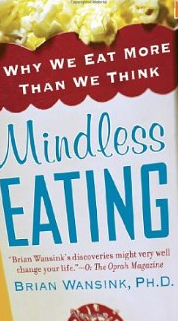I recently read “Mindless Eating: Why We Eat More Than We Think” by Brian Wansink. The quotes I found most interesting are below. As always, if you like the quotes, please buy the book here.
 “Almost any sign with a number promotion (2 for $2) leads us to buy 30 to 100 percent more than we normally would.” (24)
“Almost any sign with a number promotion (2 for $2) leads us to buy 30 to 100 percent more than we normally would.” (24)
“If we consciously deny ourselves something again and again, we’re likely to end up craving it more and more.” (27)
“Dish out 20 percent less than you think you might want before you start to eat.” (34)
“If our guests had their tables continually bussed, they continually ate. Clean plate, clean table, get more, eat more.” (39)
“If a person thinks he ate less than that typical volume, he’ll think he’s hungry. If he thinks he ate more, he’ll think he’s full.” (45)
“Volume trumps calories. We eat the volume we want, not the calories we want. If you were to make a given amount of food twice as caloric, people wouldn’t complain that they couldn’t eat all of it. If you made the same amount half as caloric, people wouldn’t complain they were still hungry. In both cases, they would say they were full.” (45)
“The faster we wolf down our food, the more we eat.” (46)
“Sure, a person saves some money by buying the big M&M’s bag, but if he decides to watch a hundred videos in the next yar, it will also cost him nine pounds of extra weight.” (59)
“We all consume more from big packages, whatever the product.” (59)
“Our brains have a basic tendency to overfocus on the height of objects at the expense of their width.” (62)
“The people given a short, wide glass poured an average of 19 percent more juice or soft drink than those given the tall, thin glass.” (63)
“Setting the table with the wrong dinner plates or serving bowls – the big ones – sets the stage for overeating.” (70)
“Increasing the variety of a food increases how much everyone eats.” (71)
“The more you think of something, the more of it you’ll eat.” (80)
“The more hassle it is to eat, the less we eat.” (84)
“When people ate alone, some ate very little and others ate quite a lot… When eating in groups of four or eight, light eaters ate more, and heavy eaters ate less.” (98)
“It’s about as close to an established fact as things get in the social sciences: People who watch a lot of TV are more likely to be overweight than people who don’t. The less TV people watch, the skinnier they are. It doesn’t matter if they’re 14 or 44. It doesn’t matter if they watch network TV, cable TV, the Food Network, or the NASCAR Network. As TV viewing goes up, weight goes up.” (102)
“Anything that takes our focus off the food makes us more likely to overeat without knowing it.” (104)
“The atmosphere of a restaurant can cause you to overeat if it gets you to stay longer (thus ordering and eating more), or if it gets you to eat faster.” (106)
“If we can’t see the food and someone tells us we’re going to taste strawberry, we taste strawberry, even if it’s really chocolate.” (120)
“If you expect food to taste good, it will. At the very least, it will taste better than if you had thought it would only be so-so… If you expect a food to taste bad, it will.” (122)
“The foods with descriptive names sold 27 percent more. And even though they were priced exactly the same, the customers who ate them consistently rated them as a better value than did the people who ate the same dishes with the boring old names.” (126)
“The foods with descriptive names were rated as more appealing and tastier than the identical foods with the less attractive labels.” (126)
“The customers who ate the food with descriptive names had more favorable attitudes toward the cafeteria as a whole.” (127)
“Despite what they say, most people can’t pick their brand once it’s out of the package and into a bowl.” (130)
“Most people use a two step approach to buying wine: they choose a price level, say $10, and they then look for a bottle with a nice-looking label.” (133)
“The feelings we have when we first eat a food can follow us for a lifetime. It doesn’t matter whether we’re an adult or a child.” (156)
“We discovered that people who ate the best one first often shared one of two characteristics: they either grew up as a youngest child or came from large families. The people most likely to save the best for last, on the other hand, had grown up as an only child or as the oldest.” (158)
If you liked the quotes, please buy the book here.

